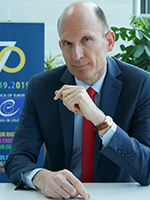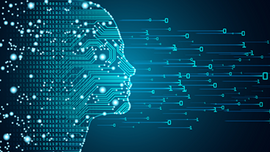How to regulate the development of artificial intelligence?

Therefore, we clearly need regulation to leave essential decision-making to humans and not to mathematical models, whose adequacy and biases are not controlled. The Council of Europe was quick to propose a framework for biomedicine when scientists succeeded in cloning a sheep for the first time in 1996: even today, the Oviedo Convention, opened for signature in 1997, remains the only binding international legal instrument for the protection of human rights in the biomedical field which, by incorporating the principles developed by the European Convention on Human Rights in the field of biology and medicine, prohibits human cloning.
Similarly, machine learning cannot be developed without setting clear limits beyond which the risks of discrimination, infringement of privacy, security or dignity, restriction of freedom of expression or manipulation of opinion become unacceptable. The tech industry and AI designers, with whom we are already in dialogue, are calling for a better link with institutions but we need to go even further, quickly.
As part of the Council of Europe's Elsinore reform process, the Secretary General will propose to the Committee of Ministers a strategic agenda and to include, by 2028, the issue of AI regulation as one of the major challenges in order to find a fair balance between the benefits of technological progress and the protection of our fundamental values.
This site will enable you to follow all our work on these key issues.
Jan Kleijssen
Director, Information Society - Action against Crime
Speeches and articles
Speeches
- Joint conference between the Parliamentary Assembly of the Mediterranean and the Council of Europe, "Counter-terrorism and new technologies: from prevention to prosecution, at national and international levels the need for parliamentarians’ support", 10 October 2019, Strasbourg
- Conference of high-ranking representatives of Ministers of Internal Affairs on dealing with Domestic violence "The police, a key player in the fight against domestic violence’’, 24 September 2019, Strasbourg
- Forum de la Gouvernance internet, 4 juillet 2019, Paris
- Third Global Conference of the Internet & Jurisdiction Policy Network, 5 June 2019, Berlin
- 24th Council of Europe Conference of Directors of Prison and Probation Services “Offender Management: Tradition and Technology”, 21 May 2019, Ayia Napa, Cyprus
- 21st PC-CP Working Group meeting, 01 April 2019, Strasbourg
- Conference "Media Pluralism - How can we deliver?" - Media Pluralism in the Framework of the Council of Europe, 20 March 2019, Strasbourg
- High-level Conference "Governing the Game Changer - Impacts of artificial intelligence development on Human Rights, Democracy and the Rule of Law", 26-27 February 2019, Helsinki, Finland
- Conference "I Diritti Umani nel Mondo Contemporaneo", organised by the Lions Club International Distretto 108 Tb, Centro Studi e Archivio Storico “Gian Piero Gardini”
16 February 2019, Ferrara, Italy - GRECO 77th plenary meeting,16-18 October 2017, Strasbourg
- Internet Freedom Conference - The role and responsibilities of internet intermediaries, Vienna, 13 October 2017
- 39th International Conference of Data Protection and Privacy Commissioners ICDPPC, Hong Kong, 27 September 2017
- First Draft Network Meeting, Strasbourg, 3 July 2017
- The Royal Netherlands Society of International Law (KNVIR) Spring meeting: Fake News and National Sovereignty, The Hague, 13 June 2017
- ICANN58 - Cross Community Discussion with Data Protection Commissioners, Copenhagen, 13 March 2017
- The 2016 OSCE-wide Counter-Terrorism Conference, Berlin, 31 May-1 June 2016
- UNIDROIT 90th Anniversary Conference, Rome, 20 April 2016
- Technical Meeting of the Counter-Terrorism Committee Executive Directorate on ”Preventing Terrorists from Exploiting the Internet and Social Media to Recruit Terrorists and Incite Terrorist Acts, while Respecting Human Rights and Fundamental Freedoms”, New York, 16-17 December 2015
- 20th Council of Europe Conference of Directors of Prison and Probation Services, Bucharest, 9-10 June 2015
- Global Conference on Cyber Space 2015, The Hague, 16 April 2015
- Journée contributive sur “La loyauté dans l’environnement numérique", Strasbourg, 9 janvier 2015
- International Conference on Terrorism and Organised Crime, Malaga, 25-26 September 2014
- 45th Plenary meeting MONEYVAL, Strasbourg, 15 September 2014
Articles
- "POLITICO AI: Decoded: The AI treaty you’ve never heard of — A tech industry reckoning — Sabre-rattling",15 July 2020
- "Countering disinformation with smart standards: The Council of Europe perspective", 11 October 2019, in: Security and Human Rights Monitor
- Conseil de l’Europe et intelligence artificielle: les droits de l’homme, l’État de droit et la démocratie face aux défis du développement et de l’utilisation de l’intelligence artificielle, 2019, in l'Observatoire de Bruxelles
- "Chapter 7: Cybercrime, Evidence and Territoriality: Issues and Options", in: "Netherlands Yearbook of International Law 2016", 2017 (co-author Pierluigi Perri)
- “Freedom of expression – does it need to be defined?” in Halsbury’s Law Exchange, November 2015
- "The Council of Europe Medicrime Convention", 3 May 2014 (co-author Susanne Keitel)
- "A Magna Carta for the Internet?", 21 March 2014
- "Human rights-based and people-centred Internet", 1 October 2013 (co-author Elvana Thaçi)
- "Council of Europe: Internet Democracy, Protecting Internet freedom - A pressing challenge", in: Synergy Magazine, 2012



